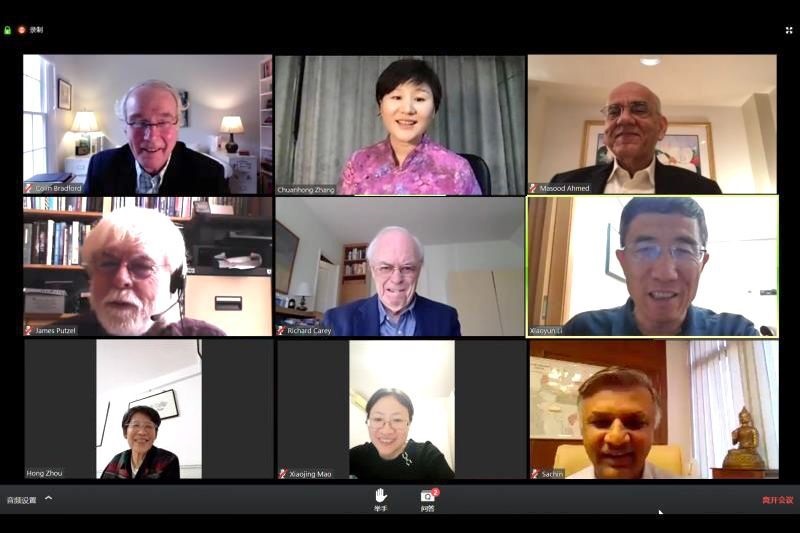Experts: Sustainable, inclusive multilateral int’l cooperation important in fight against COVID-19
en.chinagate.cn by Bai Yunzhi,June 05, 2020 Adjust font size:
On May 15, the China International Development Research Network (CIDRN) and China Agricultural University’s (CAU) China International Development Global Agriculture Academy (CIDGA) hosted an online seminar themed on “how to reshape international development cooperation amidst the COVID-19 pandemic.” Experts from China, the UK, the US, France, and other countries discussed the international community’s response to the outbreak and the future of international collaboration. The forum was moderated by Zhang Chuanhong, secretary of the CIDRN and associate professor at CAU’s College of Humanities and Development Studies and CIDGA.

On May 15, the China International Development Research Network (CIDRN) and China Agricultural University’s (CAU) China International Development Global Agriculture Academy (CIDGA) hosted an online seminar themed on “how to reshape international development cooperation amidst the COVID-19 pandemic.”
Li Xiaoyun, chair professor at CAU, honorary dean of the CIDGA, chair of the CIDRN, and chair of the Network of Southern Think Tanks (NeST), reviewed the relationship between China and the West and China’s engagement in globalization, and pointed out that China has always been a contributor to the international development system. Li also mentioned that the COVID-19 pandemic is changing international assistance and cooperation systems and that both developed and developing countries should make adjustments and reforms as the world enters a new stage of cooperation development. He noted that China has provided medical supplies to more than 150 countries and international organizations to fight against the COVID-19 pandemic in line with the concept of a global community with a shared future as well.
“Countries should carry out cross-region cooperation with their own comparative advantages and reach consensus on economic, social and cultural development,” Zhou Hong, director of the China Academy of Social Sciences (CASS) Academic Division of International Studies, expressed. She also discussed the challenges to international cooperation that have occurred during the COVID-19 pandemic period and the necessity of considering the impact of policy-making on society and humanity in order to ensure that vulnerable groups have access to public resources.
“The pandemic has had an impact on social development in developing countries and may even cause a food crisis,” Mao Xiaojing, deputy director of and senior research fellow at the Chinese Ministry of Commerce’s Chinese Academy of International Trade and Economic Cooperation (CAITEC) think tank’s Institute of International Development Cooperation, noted. “International cooperation should focus on the rights of vulnerable groups,” she agreed. Mao remarked that it is important for countries to cooperate with international organizations while the COVID-19 outbreak lasts in order to stabilize the financial environment. She also observed that the rise of populism and protectionism has had a negative impact on international cooperation and that the pandemic has made the situation worse.
“The COVID-19 pandemic and economic recession will pose challenges to market economy and domestic governance, and people-oriented social policy will be a solution to these problems,” Colin Bradford, senior fellow at the Brookings Global Economy and Development Program, global fellow of the Global Solutions Summits in Berlin, co-chair of the China-West Dialogue (CWD), and co-chair of the VISION20 workshop, stated. He believes that a global governance structure that is more representative and innovative is necessary amidst global development trends that tend towards multipolarity and advocates multilateralism. Bradford mentioned that international cooperation is an essential part of individual countries achieving sustainable development as well.
Richard Carey, chair of CIDRN’s International Advisory Committee and former director-general of the OECD Development Assistance Committee (DAC) Development Co-operation Directorate, noted that China helped resolve debt repayment difficulties in some countries via bilateral channels as part of the battle against the effects of the COVID-19 pandemic. He also remarked that China will engage in in-depth cooperation with various African countries via the G20 forum and Forum on China-Africa Cooperation in the future.
“Countries should strengthen international cooperation in science and technology to combat the pandemic,” James Putzel, professor of Development Studies at the London School of Economics and Political Science International Development Department and Member of CIDRN’s International Advisory Board, stated. He noted that the COVID-19 outbreak is causing global economic decline, affecting multilateral cooperation, and causing shortages of food and medical supplies as well. Putzel indicated that the resulting debt crisis will have a huge impact on developing countries and that global financial shocks will lead to large-scale loss of international financial support, especially for low-income countries. He concluded by discussing China’s positive attempts at engaging in international cooperation related to public health and stated that the establishment and promotion of global public health systems should continue to be pursued in the future.
Masood Ahmed, president of the Center for Global Development, mentioned that the pandemic has had a great impact on global development and developing countries in particular and that declines in per capita income may cause social problems and cause developing countries to change their financial models. He also remarked that national security issues caused by the COVID-19 will have a profound impact on international development and cooperation and that the world requires extensive multilateral cooperation, and emphasized that developing countries should be provided with support. Ahmed emphasized the necessity of China and the U.S. being actively involved in multilateral global cooperation as well.
Sachin Chaturvedi, director-general of the Research and Information System for Developing Countries (RIS) and member of the Reserve Bank of India’s board of governors, remarked that the global development model should prioritize diversified, inclusive, high-quality development rather than GDP and should focus on sustainability, be development-oriented and people-centered, and meet international standards. He noted that this requires transparent criterion and the exercising of international responsibility. Chaturvedi pointed out the importance of strengthening the role of the multilateral system as well, especially the United Nations.
